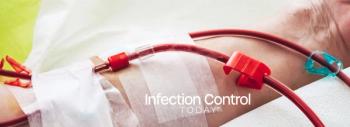
COVID-19 Game Changer: Newly Approved Machine Can Decontaminate 80,000 Respirator Masks Per Day
The machine can decontaminate the same respirator mask up to 20 times without degrading the mask’s performance.
A machine that can decontaminate up to 80,000 respirators a day has been granted Emergency Use Authorization by the US Food and Drug Administration this morning. The decontamination system, made by a company called Battelle, is the CCDS Critical Care Decontamination System and uses vapor phase hydrogen peroxide to decontaminate the masks. Respirators are in short and dwindling supply.
“This could be a game changer,” says Kevin Kavanagh, MD, a member of Infection Control Today®’s Editorial Advisory Board. “The process not only has to sterilize the mask but also preserve the integrity of the filtering material and straps. Even if these masks could just be re-sterilized a few times, it could potentially more than double a facility’s supply.”
In fact, the machine “can decontaminate the same respirator mask up to 20 times without degrading the mask’s performance,” according to a Battelle
And it comes not a moment too soon.
President Trump
Ann Marie Pettis, RN, BSN, CIC, FAPIC, APIC’s president-elect, works in New York State, which she called the epicenter of the COVID-19 outbreak in the United States and said that “as an infection preventionists our days are spent frantically searching for PPE, advising fellow clinicians on how to reuse masks, gowns, goggles, and all the other PPE that they currently have, or actually how to create their own. And truly this goes against everything we have known from the scientific evidence, and what we have always taught our staff. We’re trying to protect our coworkers as best we can. But we need help now.”
Another ICT®Editorial Advisory Board Member, Saskia v. Popescu, PhD, MPH, MA, CIC, says that “as the US works to protect healthcare workers in the midst of a PPE shortages, we are having to re-evaluate approaches for extended use. Efforts to disinfect masks to allow for a longer period of use are being evaluated daily and I look forward to a new method from Battelle as they are leaders in the field of biodefense and innovation.”
However, Editorial Advisory Board Member Linda Spaulding RN, BC, CIC, CHEC, CHO, wants to know more about the decontamination machines. “I look at this with caution because during time of crisis many people come out with products they say do something but turn out to be just hype,” says Spaulding. “I hope the FDA does their due diligence on this review and does not approved it just because there is a crisis and mask shortage. I hope there is not a push from the government to slide it through without being sure it does what they claim. If it doesn’t work this would put a lot of healthcare workers at risk.”
Battelle, which is based in Columbus, Ohio, said in its press release that “the respirator masks are exposed to the validated concentration level for 2.5 hours to decontaminate biological contaminates, including SARS-CoV-2.”
Two of the machines are expected to be employed in Ohio, while others will be heading to New York, Seattle, and Washington, D.C.
“This will not only help Ohio's healthcare workers on the front lines of the COVID-19 crisis, but Battelle will also be helping health care workers in hot spots throughout the country including New York and Washington state,” Ohio Governor Mike DeWine said in the press release.
Matthew Vaughan, Senior Vice President of Battelle’s Contract Research Organization, said that “we’re grateful for the support of our state and federal officials and other business partners. All parts of Battelle are working extended hours and weekends to ramp up manufacturing and operation of the Critical Care Decontamination System. Our partnership with Central Ohio healthcare systems has been crucial to working out critical details.”
Newsletter
Stay prepared and protected with Infection Control Today's newsletter, delivering essential updates, best practices, and expert insights for infection preventionists.




